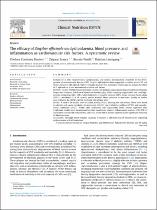| dc.contributor.author | Daniels, Chelsea Courtney | |
| dc.contributor.author | Isaacs, Zaiyaan | |
| dc.contributor.author | Leisegang, Kristian | |
| dc.contributor.author | Finelli, Renata | |
| dc.date.accessioned | 2023-05-19T08:01:22Z | |
| dc.date.available | 2023-05-19T08:01:22Z | |
| dc.date.issued | 2022 | |
| dc.identifier.citation | Daniels, C.C., Isaacs, Z., Finelli, R. and Leisegang, K., 2022. The efficacy of Zingiber officinale on dyslipidaemia, blood pressure, and inflammation as cardiovascular risk factors: A systematic review. Clinical Nutrition ESPEN | en_US |
| dc.identifier.uri | https://doi.org/10.1016/j.clnesp.2022.08.031 | |
| dc.identifier.uri | http://hdl.handle.net/10566/8921 | |
| dc.description.abstract | Background & aims: Hypertension, dyslipidaemia, and chronic inflammation contribute to the development of cardiovascular disease (CVD). Zingiber officinale has been suggested to reduce these CVD risk factors; however, the clinical evidence remains unclear. This systematic review aims to analyse the effect of Z. officinale as a sole intervention on these risk factors. Methods: In this PRISMA-based systematic review, we included randomised clinical trials from PubMed, Scopus and Cochrane Database of Systematic Reviews (July 2020) analysing triglycerides, low- and highdensity lipoprotein (LDL, HDL), total cholesterol, C-reactive protein (CRP), tumor necrosis factor-alpha (TNF-a), interleukin 1, 6, 10, systolic and/or diastolic blood pressure as outcomes. Quality of studies was evaluated by JADAD and the Cochrane risk-of-bias tools. Results: A total of 24 studies were included, mostly (79.2%) showing low risk of bias. These were based on obesity and cardio-metabolic derangements (33.3%), type 2 diabetes mellitus (37.5%), and miscellaneous conditions (29.2%). While total cholesterol and triglycerides levels mostly improved after Z. officinale, results were inconsistent for other blood lipids markers. Inflammatory markers (CRP, TNF-a) were more consistently reduced by Z. officinale, while only 3 studies reported a non-significant reduction of blood pressure. Conclusions: Although there remains a paucity of studies, Z. officinale may be beneficial for improving dyslipidaemia and inflammation. | en_US |
| dc.language.iso | en | en_US |
| dc.publisher | Clinical Nutrition ESPEN | en_US |
| dc.subject | Zingiber officinale | en_US |
| dc.subject | Cardiovascular disease | en_US |
| dc.subject | Blood pressure | en_US |
| dc.subject | Dyslipidaemia | en_US |
| dc.subject | Inflammation | en_US |
| dc.title | The efficacy of zingiber officinale on dyslipidaemia, blood pressure, and inflammation as cardiovascular risk factors: A systematic review | en_US |
| dc.type | Article | en_US |

